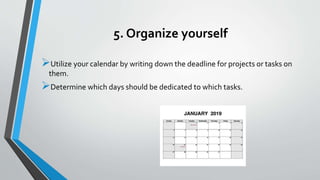Time Management ppt
- 1. Presentation onTime Management By Rajiv Kataria
- 3. Time Management • Time management” is the process of organizing and planning how to divide your time between specific activities. • Good time management enables you to work smarter – not harder – so that you get more done in less time, even when time is tight and pressures are high.
- 4. WhyTime Management •To utilise the available time in optimum manner to achieve one’s personal and professional goals.
- 5. Advantages • Greater productivity and efficiency. • Work completion onTime • A better professional reputation. • Less stress. • Increased opportunities for advancement. • Greater opportunities to achieve important life and career goals.
- 6. Bad time management = stress
- 7. Failing to manage your time effectively can have some very undesirable consequences: • Missed deadlines. • Inefficient work flow. • Poor work quality. • A poor professional reputation and a stalled career. • Higher stress levels.
- 8. Techniques OfTime Management • Spending a little time learning about time-management techniques will have huge benefits now – and throughout your career.
- 9. 1. Set goals correctly Set goals that are achievable and measurable to improve time management. Use the SMART method when setting goals. In essence, make sure the goals you set are specific, measurable, attainable, relevant, and timely.
- 10. 2. Prioritize wisely Separate your tasks on how important and urgent they are in order to achieve good time management. For example, look at your daily tasks and determine
- 11. Important and urgent Do these tasks right away. Important but not urgent Decide when to do these tasks Urgent but not important : Delegate these tasks if possible Not urgent and not important Do these tasks later
- 12. 3. Set a time limit to complete a task Setting a time constraint will cause you to be more focused and efficient. For example, instead of working on a project and thinking of doing it until it’s done, set a limit of, say, three hours.
- 13. 4.Take a break between tasks For People who work Continousely When doing a lot of tasks without a break, it is harder to stay focused and motivated. Allow some downtime between tasks by performing some mind-clearing exercises like taking a quick nap, going for a short walk, or meditating.
- 14. 5. Organize yourself Utilize your calendar by writing down the deadline for projects or tasks on them. Determine which days should be dedicated to which tasks.
- 15. 6. Remove non-essential tasks/activities It is important to remove excess activities or tasks that add no value to your life. Determine what is significant and what deserves your time. Removing non-essential tasks/activities frees up more time.
- 16. 7. Create a daily plan. • Use the first 30 minutes of your day to create a daily to-do list that suits your weekly plan. • Word your list items as if you’ve already completed them.
- 17. 8. Complete your most important and demanding tasks first thing in the morning. • you can focus more easily when your brain isn’t fully awake.
- 18. 9. Block out distractions. • Keep your Mobile Phones silent • Use your computer’s “do not disturb” function when working on focused tasks.
- 19. 10. Don’t strive for perfection. • To become exceptional, you must fail repeatedly and learn from your mistakes. • Look at every effort as an experiment – a valuable step on your journey, no matter what the outcome.
- 20. 11.Train the other side of your brain. • Spending time outside of your comfort zone leads to success. • If you’re a lawyer, learn to dance. • If you’re a software developer, go out and socialize.
- 21. 12. Exercise often. • Sports help you handle everyday stressors. • Set some time aside for short workouts – at least every other day.
- 22. 13. Sleep well • Scientists have found that sleeping less to create more task-oriented time leads to trouble. • Tired people procrastinate more and get distracted easily. • Give your brain at least eight hours of sleep every night.
- 23. 14. Learn to say No. • Your time is precious. Don’t waste it on people and projects that don’t align with your mission and goals. • Instead of automatically accepting invitations and offers, say, ‘I’ll check my schedule and get back to you’.
- 24. 15. Be early • Use the same approach with deadlines. • Plan to submit your work one day ahead of schedule.
- 25. 16. Don’t answer the phone just because it’s ringing. Avoid interruptions when working on high-focus tasks. You can attend if it is important otherwise you can say “ I am at work get back to you later.
- 26. 17. Plan ahead Make sure you start every day with a clear idea of what you need to do. For example, the night before, you can write down a list of to-dos for the next day.
- 27. •Yesterday is a cancelled Cheque,Tomorrow is a Promisory note,Today is ready cash. Use it.
- 28. Recap • 1. Set goals correctly • 2. Prioritize wisely • 3. Set a time limit to complete a task • 4.Take a break between tasks • 5. Organize yourself • 6. Remove non-essential tasks/activities • 7. Create a daily plan • 8. Complete your most important and demanding tasks first thing in the morning.
- 29. Recap • 9. Block out distractions • 10. Don’t strive for perfection • 11.Train the other side of your brain. • 12. Exercise often • 13. Sleep well • 14. Learn to say No. • 15. Be early • 16. Don’t answer the phone just because it’s ringing • 17. Plan ahead
- 30. Any Questions
- 31. Activity Time
- 32. Thank You. • Presented By: Rajiv Kataria MBA ( Finance and HR) E Mail at- rajivkataria19@gmail.com































